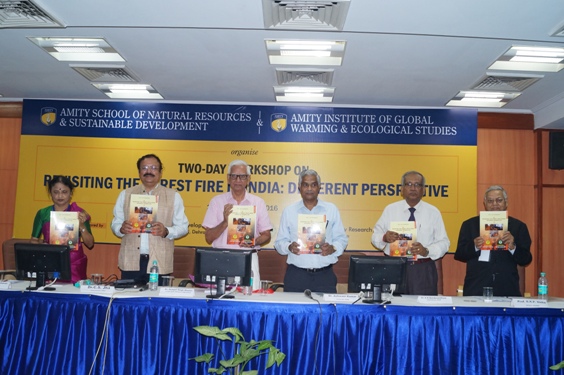19 Jul 2016|Noida | Amity Campus Sector- 125 Noida
Amity School of Natural Resources and Sustainable Development (ASNRSD) in collaboration with Indian Council of Forestry Research & Education and Uttarakhand Van Vikas Nigam, Dehradun organised Workshop on Revisiting Forest Fires

“Forest Fire is a double edged sword”- avers experts during the inauguration of Workshop on “Revisiting the Forest Fire in India: Different Perspective” at Amity
Amity School of Natural Resources and Sustainable Development (ASNRSD) in collaboration with Indian Council of Forestry Research & Education and Uttarakhand Van Vikas Nigam, Dehradun started two-day Workshop on “Revisiting the Forest Fire in India: Different Perspective” at Amity University Campus, Noida.
More than 50 Scientists, Forest Officers, NGO members, Research Scholars and students have participated in the Workshop.
Dr. Sompal Singh Shastri, Former Union Minister of Agriculture, Dr. Ashwani Kumar, DG (Retd), Indian Council of Forestry Research and Education(ICFRE), Dr. C.S. Jha, Group Director (Forest and Ecology), National Remote Sensing Centre, Prof. B.K.P. Sinha, Advisor, Amity School of Natural Resources and Sustainable Development(ASNRSD) and Dr. Indrani Chandrasekharan, Director, ASNRSD inaugurated the Workshop.
Welcoming the distinguished gathering, Dr. Indrani Chandrasekharan, Director, Amity School of Natural Resources and Sustainable Development said that Forest Fire is a serious threat to the Flora, Fauna and Diversity of a region. Quoting the statistics, she remarked that 50% of the total forest area in India is vulnerable to forest fire out of which 6.2% has frequent incidences of fire outbreaks. She stressed that the Workshop aims to bring together Scientists, Forest Managers and Practitioners across the States to discuss and share technological developments and scientific advancements which could be used for better handling the incidences of raging forest fires.
Sharing his views, Mr. Sompal Shastri said that the importance of forests canno be undermined since the existence of human beings depends upon forests. He apprised that fire is a natural occurrence both in forests as well as grassland ecology and controlled fire or burning is a tool for foresters to augment the output. He pointed out that controlled burning is required occasionally to save the ecological balance of flora and fauna as the domination of some species is required to be checked by burning them to protect the extinction of other important and useful species. Mr. Shastri stressed that the assessment of loss of forest resources is measured in terms of loss of timber but it is necessary to focus on other factors as well such as soil erosion, loss of water,medicinal plants etc. He averred that it is important for forest officials to formulate polices to protect forests for peaceful co-existence of all species.
Prof. B.K.P. Sinha, Advisor, ASNRSD remarked that forest fires are double edged swords which if, used in a controlled manner could be beneficial for agricultural and increasing productivity but if allowed to spread unchecked, could be very detrimental to the flora and fauna. He suggested that local people need to be roped in and traditional knowledge needsto be harnessed in order to check the Forest Fires.
Addressing the gathering, Dr.Ashwani Kumar, DG (Retd), Indian Council of Forestry Research and Education(ICFRE)said that Amity and ICFRE have join hands to work collaboratively in the area of Environment, Ecology and Forests. Commenting on the forest fires, he said that if forest fire goes wild and keeps on occurring repeatedly in the same area, it causes permanent damage to the ecology of the area. He remarked that forest fires have become matter of concern globally since the smoke generated during forest fires spreads to adjoining areas, irrespective of political boundaries leading to rise in Carbon Dioxide levels in the environment. He stressed that 90% of Forest Fires are caused by human beings therefore, the people staying nearby have to be made aware about the long term ramifications of Forest Fires, which affects ecology and economy of a region.
Sharing his views during the Workshop one of the participants- Mr. Karan SinghRandhawa, Sub Divisional Officer- Forest (Madhya Pradesh) said that such Workshops are very important for forest management to build the capacity of officials through interaction with eminent speakers and practitioners in the same field. He mentioned that the topic of the current Workshop is very apt in the present times, as it focuses on how to control forest fire and also to assess the loss of forest resources due to fire. Mr.Randhawa opined that the officials should keep on attending such workshops for knowledge augmentation on current issues and new policies.
During the day, three technical Sessions unfolded- “Forest Fire in India dealing with the Issues-Policy,Strategy and Legislation”, “Current Fire status – Data, Methods, Documentation”and “Need for an integrated approach for the management of Forest Fire”